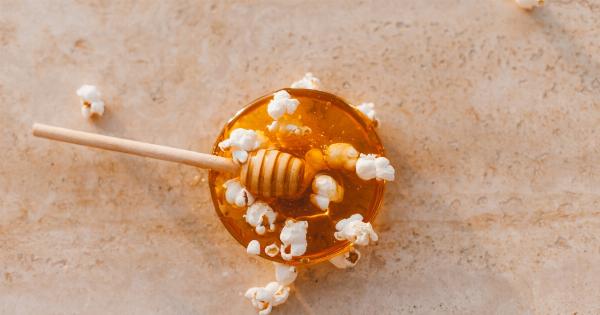Popcorn is a beloved snack that is enjoyed by people of all ages. Whether at the movies, during a game night, or simply as a quick snack, popcorn has become a staple treat.
However, there has been ongoing debate about whether popcorn can be considered a nutritious choice. In this article, we will delve into the nutritional value of popcorn, its potential benefits, possible downsides, and how to make the most nutritious choice when opting for this popular snack.
The Nutritional Composition of Popcorn
Popcorn is made from a type of corn called zea mays everta. It is a whole grain that undergoes a unique popping process when heated.
The nutritional composition of popcorn, especially when prepared without excessive amounts of unhealthy additives, can provide several health benefits.
Here is an overview of the key nutrients found in popcorn:.
- Fiber: Popcorn is a great source of dietary fiber, with an average of 3.6 grams per 1-ounce (28 gram) serving. This accounts for around 14% of the recommended daily intake (RDI).
- Protein: While not a significant source of protein, popcorn contains small amounts that contribute to its overall nutritional value.
- Vitamins: Popcorn contains various vitamins, such as thiamin (B1), riboflavin (B2), niacin (B3), and folate (B9). These vitamins play important roles in maintaining overall health and supporting normal bodily functions.
- Minerals: Popcorn is a good source of minerals like magnesium, phosphorus, zinc, and manganese.
- Antioxidants: Popcorn contains a high amount of polyphenols – compounds with antioxidant properties that help protect the body against harmful free radicals.
Health Benefits of Popcorn
Despite its reputation as a movie theater treat, popcorn can offer several health benefits when consumed as a part of a balanced diet:.
1. Rich in Dietary Fiber
One of the significant health benefits of popcorn is its high dietary fiber content. Fiber is essential for maintaining a healthy digestive system, promoting regular bowel movements, and preventing constipation.
Additionally, a diet rich in fiber can help to manage weight, reduce the risk of heart disease, and regulate blood sugar levels.
2. Whole Grain Goodness
Popcorn is a whole grain, meaning it contains all parts of the grain. Whole grains are a valuable source of essential nutrients and phytochemicals that can contribute to better health.
Studies have shown that consuming whole grains may lower the risk of developing chronic conditions such as type 2 diabetes, heart disease, and some types of cancer.
3. Low in Calories
Compared to many popular snack options, popcorn is relatively low in calorie content. A 1-ounce serving of air-popped popcorn contains an average of 30 calories, making it a reasonable choice for those trying to manage their calorie intake.
However, it’s important to note that added toppings or cooking methods can significantly increase the calorie content of popcorn.
4. Antioxidant Powerhouse
The polyphenols found in popcorn act as antioxidants, which can help reduce inflammation, protect against cellular damage, and lower the risk of chronic diseases.
In fact, research suggests that the concentration of antioxidants in popcorn is higher than some fruits and vegetables.
5. Gluten-Free Option
For individuals with celiac disease or gluten sensitivity, popcorn is a safe and satisfying snack choice. Being naturally gluten-free, it allows those on a gluten-free diet to enjoy a crunchy and flavorful treat without any adverse effects.
Potential Downsides to Consider
While popcorn can offer several health benefits, it is crucial to be aware of potential downsides and make informed choices:.
1. Unhealthy Additives and Toppings
Many commercially available popcorn products come loaded with unhealthy additives, such as artificial flavors, excessive salt, and unhealthy fats.
To maximize the nutritional value of popcorn and minimize potential health risks, it is crucial to choose air-popped popcorn or prepare it at home using healthier cooking methods and seasonings.
2. Potential for Choking Hazard
Popcorn can be a choking hazard, particularly for children under the age of four, as well as older adults who may have difficulty chewing or swallowing.
It is important to supervise young children while they are eating popcorn and to avoid serving them popcorn that is heavily coated in caramel, toffee, or other hard toppings.
3. Acrylamide Formation
When popcorn is heated at high temperatures, it can undergo a chemical reaction that leads to the formation of a compound called acrylamide. This compound has been associated with an increased risk of certain cancers when consumed in large quantities.
However, the exact impact of acrylamide in popcorn on human health is still being researched, and the levels found in popcorn are generally considered to be low.
Making the Most Nutritious Choice
To ensure you are making the most nutritious choice when enjoying popcorn as a snack, consider the following tips:.
1. Opt for Air-Popped Popcorn
Air-popped popcorn is the healthiest option as it doesn’t require any added fats or oils during the cooking process. This helps to keep the calorie and fat content low while still providing all the benefits of whole grain goodness.
2. Avoid Microwave Popcorn
Most commercially available microwave popcorn products contain artificial flavors, unhealthy fats, and excessive salt. Additionally, the bags used for microwave popcorn may contain harmful chemicals like perfluorooctanoic acid (PFOA).
It is best to avoid microwave popcorn and opt for air-popping or stove-top methods instead.
3. Limit Unhealthy Toppings
While it may be tempting to enjoy popcorn with butter, caramel, or cheese coatings, these toppings can significantly increase the calorie and fat content of your snack.
Instead, opt for healthier seasonings like herbs, spices, or nutritional yeast, which can add flavor without packing on extra calories.
4. Control Portion Sizes
Although popcorn can be a healthy snack in moderation, consuming excessive amounts can lead to an increased calorie intake. Be mindful of portion sizes, and avoid mindlessly eating directly from a large bag or container.
Instead, portion out a sensible serving size to prevent overindulgence.
Popcorn Alternatives
If you’re looking for alternative snacks that offer similar crunch and satisfaction, here are a few options:.
1. Roasted Chickpeas
Roasted chickpeas are packed with protein and fiber, making them a nutritious alternative to popcorn. They can be seasoned with various herbs and spices to create a flavorful snack.
2. Rice Cakes
Rice cakes are low in calories and provide a crispy texture. Look for whole grain varieties that offer more nutritional value and pair them with toppings like avocado, hummus, or nut butter for added taste and nutrients.
3. Veggie Chips
Veggie chips made from thinly sliced vegetables, such as kale, carrots, or zucchini, can be a nutrient-rich substitute for popcorn. These chips can be baked or dehydrated for a crunchy texture and can be enjoyed with various dips or salsas.
4. Whole Grain Pretzels
Whole grain pretzels can be a healthier alternative to popcorn, particularly when choosing brands that are low in sodium. They still provide a satisfying crunch and can be enjoyed on their own or paired with a dip of your choice.
In Conclusion
Popcorn, in its natural form, can indeed be considered a nutritious snack choice. Its high fiber content, whole grain goodness, and antioxidant properties make it a valuable addition to a balanced diet.
However, it is essential to make informed choices, opting for air-popped popcorn and avoiding unhealthy toppings or excessive consumption. By being mindful of portion sizes and considering healthy alternatives, popcorn can be enjoyed guilt-free as part of a healthy lifestyle.
























